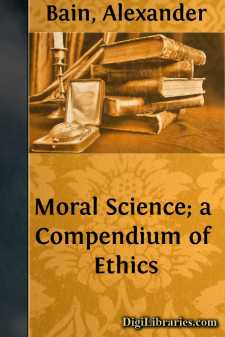Categories
- Antiques & Collectibles 13
- Architecture 36
- Art 48
- Bibles 22
- Biography & Autobiography 813
- Body, Mind & Spirit 142
- Business & Economics 28
- Children's Books 14
- Children's Fiction 11
- Computers 4
- Cooking 94
- Crafts & Hobbies 4
- Drama 346
- Education 46
- Family & Relationships 57
- Fiction 11829
- Games 19
- Gardening 17
- Health & Fitness 34
- History 1377
- House & Home 1
- Humor 147
- Juvenile Fiction 1873
- Juvenile Nonfiction 202
- Language Arts & Disciplines 88
- Law 16
- Literary Collections 686
- Literary Criticism 179
- Mathematics 13
- Medical 41
- Music 40
- Nature 179
- Non-Classifiable 1768
- Performing Arts 7
- Periodicals 1453
- Philosophy 64
- Photography 2
- Poetry 896
- Political Science 203
- Psychology 42
- Reference 154
- Religion 513
- Science 126
- Self-Help 84
- Social Science 81
- Sports & Recreation 34
- Study Aids 3
- Technology & Engineering 59
- Transportation 23
- Travel 463
- True Crime 29
Alexander Bain
Alexander Bain (1818–1903) was a Scottish philosopher and educational reformer, known for his contributions to psychology, logic, and linguistics. He was a key figure in the development of associationist psychology and the founder of the journal "Mind", the first academic journal devoted to philosophy and psychology. His notable works include "The Senses and the Intellect" (1855) and "The Emotions and the Will" (1859), which explored the connections between mental processes and physiological states. Bain also played an influential role in the development of modern English grammar and composition with his book "An English Grammar" (1863).
Author's Books:
Sort by:
by:
Alexander Bain
PART I. THE THEORY OF ETHICS. CHAPTER I. PRELIMINARY VIEW OF ETHICAL QUESTIONS. I.—The ETHICAL STANDARD. Summary of views. II.—PSYCHOLOGICAL questions. 1. The Moral Faculty. 2. The Freedom of the Will; the sources of Disinterested conduct. III.—The BONUM, SUMMUM BONUM, or Happiness. IV.—The CLASSIFICATION OF DUTIES, and the Moral Code. V.—Relationship of Ethics to POLITICS. VI.—Relation to...
more...
by:
Alexander Bain
I. On the prevailing errors on the mind, proposed to be considered in this paper, some relate to the Feelings, others to the Will. In regard to Mind as a whole, there are still to be found among us some remnants of a mistake, once universally prevalent and deeply rooted, namely, the opinion that mind is not only a different fact from body—which is true, and a vital and fundamental truth —but is to...
more...



